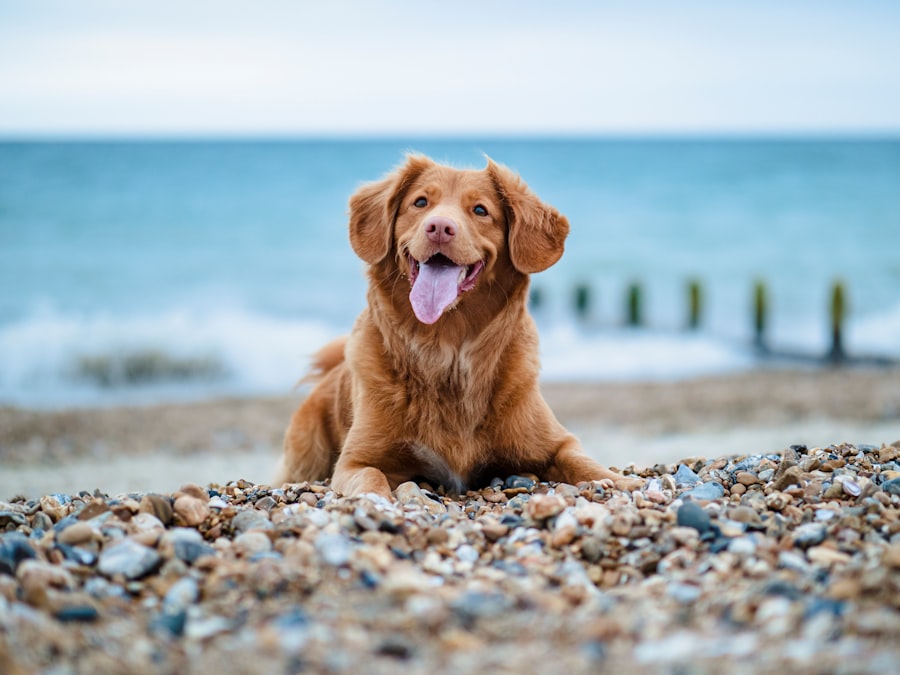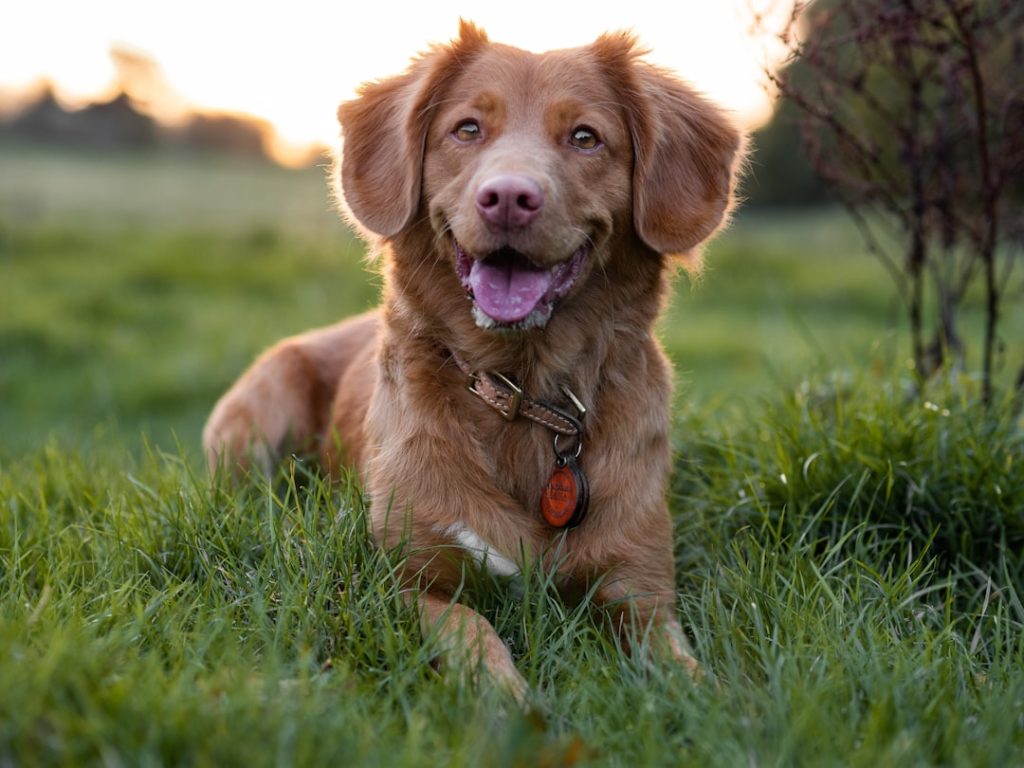The Nova Scotia Duck Tolling Retriever, also known as the Toller, is a medium-sized breed that originated in the early 19th century in the Little River District of Yarmouth County, Nova Scotia, Canada. The breed was developed to toll, lure, and retrieve waterfowl. The Toller is the smallest of the retrievers and is known for its distinctive red coat and playful nature. The breed’s name comes from its ability to lure ducks within gunshot range by playing along the shoreline, a technique known as “tolling.” The Toller was officially recognized by the Canadian Kennel Club in 1945 and by the American Kennel Club in 2003.
The Nova Scotia Duck Tolling Retriever is believed to have descended from a mix of retrievers, spaniels, and possibly collies. The breed was developed by hunters who wanted a dog that could lure and retrieve ducks in the frigid waters of Nova Scotia. The Toller’s intelligence, agility, and high energy level made it well-suited for this task. Over time, the breed’s popularity spread beyond Canada, and it is now sought after for its hunting abilities, as well as its friendly and affectionate nature. Today, the Nova Scotia Duck Tolling Retriever is recognized as a versatile and talented working dog, excelling in various dog sports such as agility, obedience, and flyball. Its history as a skilled hunting companion has made it a beloved breed for outdoor enthusiasts and families alike.
Table of Contents
- 1 What to Look for in a Nova Scotia Duck Tolling Retriever Breeder
- 2 Finding a Reputable Nova Scotia Duck Tolling Retriever Breeder in North Carolina
- 3 Questions to Ask a Nova Scotia Duck Tolling Retriever Breeder
- 4 The Importance of Health Testing in Nova Scotia Duck Tolling Retriever Breeding
- 5 What to Expect When Working with a Nova Scotia Duck Tolling Retriever Breeder
- 6 Tips for Choosing the Right Nova Scotia Duck Tolling Retriever Puppy
- 7 FAQs
- 7.1 What is a Nova Scotia Duck Tolling Retriever?
- 7.2 What should I look for in a Nova Scotia Duck Tolling Retriever breeder in North Carolina?
- 7.3 What health considerations should I be aware of when getting a Nova Scotia Duck Tolling Retriever?
- 7.4 What is the average lifespan of a Nova Scotia Duck Tolling Retriever?
- 7.5 What are the exercise needs of a Nova Scotia Duck Tolling Retriever?
Key Takeaways
- The Nova Scotia Duck Tolling Retriever originated in the early 19th century in Nova Scotia, Canada, where they were bred to lure and retrieve waterfowl.
- When looking for a Nova Scotia Duck Tolling Retriever breeder, it’s important to find one who prioritizes the health and well-being of the dogs, and who is knowledgeable about the breed’s specific needs.
- Finding a reputable Nova Scotia Duck Tolling Retriever breeder in North Carolina can be achieved through thorough research, referrals, and visiting local dog shows and events.
- It’s crucial to ask a Nova Scotia Duck Tolling Retriever breeder about health testing for genetic conditions, socialization practices, and the lineage of the puppies.
- Health testing is essential in Nova Scotia Duck Tolling Retriever breeding to ensure that the puppies are not at risk for hereditary diseases and to maintain the breed’s overall health and well-being.
- Working with a Nova Scotia Duck Tolling Retriever breeder involves building a relationship, receiving guidance on training and care, and being prepared for the responsibilities of owning this active and intelligent breed.
- When choosing a Nova Scotia Duck Tolling Retriever puppy, consider factors such as temperament, energy level, and the breeder’s guidance on matching the right puppy to your lifestyle and needs.
What to Look for in a Nova Scotia Duck Tolling Retriever Breeder
When looking for a Nova Scotia Duck Tolling Retriever breeder, there are several key factors to consider to ensure that you are getting a healthy and well-bred puppy. First and foremost, it is important to find a breeder who is dedicated to preserving the breed’s standard and working abilities. A reputable breeder will be knowledgeable about the Toller’s history, temperament, and health concerns. They should be able to provide you with information about the breed’s hunting instincts, exercise needs, and grooming requirements.
In addition to breed knowledge, a good Toller breeder will prioritize health testing and genetic screening for their breeding dogs. This includes testing for hip dysplasia, progressive retinal atrophy (PRA), and other hereditary conditions that can affect the breed. A responsible breeder will be transparent about the health testing results of their breeding dogs and will be able to provide you with documentation to verify the testing. They should also be able to explain how they select breeding pairs to minimize the risk of passing on genetic health issues to their puppies. Finally, a reputable breeder will prioritize the well-being of their dogs and puppies, providing them with proper socialization, veterinary care, and a clean living environment.
Finding a Reputable Nova Scotia Duck Tolling Retriever Breeder in North Carolina
If you are located in North Carolina and are looking for a reputable Nova Scotia Duck Tolling Retriever breeder, there are several resources you can use to find a responsible and ethical breeder in your area. One of the best places to start is by contacting the Nova Scotia Duck Tolling Retriever Club of Canada or the Nova Scotia Duck Tolling Retriever Club (USA). These organizations can provide you with a list of breeders who adhere to their code of ethics and breeding standards.
Another option is to attend dog shows, field trials, or other events where you can meet Toller owners and breeders in person. This will give you an opportunity to see the breed in action and speak with experienced Toller enthusiasts who can provide recommendations for reputable breeders in North Carolina. Additionally, online resources such as breed-specific forums, social media groups, and breeder directories can be helpful in connecting with Toller breeders in your area.
When contacting potential breeders, be prepared to ask questions about their breeding program, health testing protocols, and the care they provide for their dogs and puppies. Visiting the breeder’s facility in person is also important to assess the living conditions of their dogs and ensure that they are well-cared for. By taking the time to research and connect with reputable Toller breeders in North Carolina, you can increase your chances of finding a healthy and well-bred puppy.
Questions to Ask a Nova Scotia Duck Tolling Retriever Breeder
When speaking with a Nova Scotia Duck Tolling Retriever breeder, it is important to ask specific questions to ensure that they are reputable and responsible. Here are some key questions to consider asking:
1. Can you provide references from previous puppy buyers or other Toller owners?
2. What health testing do you perform on your breeding dogs? Can you provide documentation of these tests?
3. How do you socialize your puppies and prepare them for their new homes?
4. What is your approach to training and behavior management for your puppies?
5. Can you explain your breeding goals and how you select breeding pairs?
6. What support do you provide for puppy buyers after they bring their Toller home?
7. Can I visit your facility to meet your dogs and see where the puppies are raised?
By asking these questions, you can gain valuable insight into the breeder’s practices, ethics, and commitment to producing healthy and well-adjusted puppies. A responsible Toller breeder will be open and transparent in their responses and will be willing to provide you with the information you need to make an informed decision about adding a Toller puppy to your family.
The Importance of Health Testing in Nova Scotia Duck Tolling Retriever Breeding
Health testing is crucial in Nova Scotia Duck Tolling Retriever breeding to minimize the risk of hereditary health issues being passed on to future generations of Toller puppies. Responsible breeders prioritize health testing for conditions that are known to affect the breed, such as hip dysplasia, progressive retinal atrophy (PRA), and autoimmune disorders. By testing their breeding dogs for these conditions, breeders can make informed decisions about which dogs to pair together to reduce the likelihood of passing on genetic health issues.
In addition to genetic testing, responsible Toller breeders also prioritize overall health and well-being in their breeding program. This includes providing proper veterinary care for their dogs, maintaining a clean living environment, and ensuring that their dogs receive adequate exercise, mental stimulation, and socialization. By prioritizing health testing and overall wellness in their breeding program, responsible Toller breeders can help ensure that their puppies have the best possible start in life and are less likely to develop hereditary health issues as they grow.
What to Expect When Working with a Nova Scotia Duck Tolling Retriever Breeder

When working with a Nova Scotia Duck Tolling Retriever breeder, you can expect open communication, transparency, and support throughout the process of finding and bringing home your Toller puppy. A reputable breeder will take the time to get to know you and understand your lifestyle, experience with dogs, and what you are looking for in a Toller. They will be able to provide you with information about the breed’s characteristics, care requirements, and training needs to help you determine if a Toller is the right fit for your family.
Once you have chosen a breeder and reserved a puppy, you can expect ongoing communication and updates about the litter’s progress as they grow. A responsible breeder will provide you with information about the puppy’s health care, socialization experiences, and any training or behavior management that has been implemented before they come home with you. They should also be available to answer any questions or concerns you may have as you prepare for your new Toller puppy’s arrival.
After bringing your Toller puppy home, you can expect continued support from your breeder as you navigate the early stages of puppyhood. A reputable breeder will be available to offer guidance on training, behavior management, health care, and any other questions that may arise as you welcome your new Toller into your family. By working with a responsible Toller breeder, you can expect a positive and supportive experience that sets you and your puppy up for success.
Tips for Choosing the Right Nova Scotia Duck Tolling Retriever Puppy
When choosing a Nova Scotia Duck Tolling Retriever puppy, there are several factors to consider to ensure that you find the right match for your family and lifestyle. First and foremost, it is important to choose a reputable breeder who prioritizes health testing, socialization, and overall well-being in their breeding program. By selecting a responsible breeder, you can increase your chances of finding a healthy and well-adjusted Toller puppy.
In addition to choosing a reputable breeder, it is important to spend time getting to know the litter of puppies before making your decision. Look for puppies who are curious, confident, and outgoing, as these traits are indicative of a well-socialized puppy who is likely to adapt well to new environments and experiences. Pay attention to how the puppies interact with each other and with people, as this can give you insight into their temperament and personality.
Finally, consider your lifestyle and what you are looking for in a Toller puppy. Are you interested in a Toller for hunting or outdoor activities? Do you want a Toller as a family pet or companion? Communicate your preferences with the breeder so they can help guide you toward a puppy who matches your needs and expectations. By taking the time to research breeders, spend time with the litter of puppies, and communicate openly about your preferences, you can increase your chances of finding the right Nova Scotia Duck Tolling Retriever puppy for your family.
If you’re considering adding a Nova Scotia Duck Tolling Retriever to your family, you may also be interested in learning about the benefits of raising chickens. Poultry Wizard offers a helpful article on renting a chicken coop, which can be a great option for those who want to experience the joys of raising chickens without the long-term commitment of building their own coop. Additionally, their article on chicken coop run plans provides valuable insights for creating a safe and comfortable environment for your feathered friends. Whether you’re interested in dogs or chickens, both can bring joy and fulfillment to your life.
FAQs
What is a Nova Scotia Duck Tolling Retriever?
The Nova Scotia Duck Tolling Retriever, also known as the Toller, is a medium-sized breed of gundog known for its distinctive red coat and playful nature. They were originally bred in the early 19th century in the Little River District of Nova Scotia, Canada, to lure and retrieve waterfowl.
What should I look for in a Nova Scotia Duck Tolling Retriever breeder in North Carolina?
When looking for a Nova Scotia Duck Tolling Retriever breeder in North Carolina, it is important to find a reputable breeder who prioritizes the health and well-being of their dogs. Look for breeders who are registered with the American Kennel Club (AKC) and who can provide health clearances for their breeding dogs.
What health considerations should I be aware of when getting a Nova Scotia Duck Tolling Retriever?
Like all breeds, Nova Scotia Duck Tolling Retrievers are prone to certain health issues, including hip dysplasia, progressive retinal atrophy, and autoimmune thyroiditis. It is important to work with a responsible breeder who screens their breeding dogs for these and other potential health concerns.
What is the average lifespan of a Nova Scotia Duck Tolling Retriever?
The average lifespan of a Nova Scotia Duck Tolling Retriever is 12-14 years. With proper care, nutrition, and regular veterinary check-ups, Tollers can live long and healthy lives.
What are the exercise needs of a Nova Scotia Duck Tolling Retriever?
Nova Scotia Duck Tolling Retrievers are an active and energetic breed that requires regular exercise to keep them happy and healthy. They thrive on activities such as retrieving, swimming, hiking, and agility training. It is important to provide them with plenty of physical and mental stimulation to prevent boredom and destructive behaviors.
Meet Walter, the feathered-friend fanatic of Florida! Nestled in the sunshine state, Walter struts through life with his feathered companions, clucking his way to happiness. With a coop that’s fancier than a five-star hotel, he’s the Don Juan of the chicken world. When he’s not teaching his hens to do the cha-cha, you’ll find him in a heated debate with his prized rooster, Sir Clucks-a-Lot. Walter’s poultry passion is no yolk; he’s the sunny-side-up guy you never knew you needed in your flock of friends!







